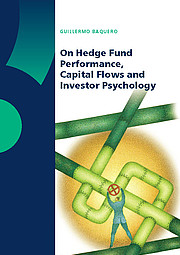On Hedge Fund Performance, Capital Flows and Investor Psychology Defended on Thursday, 7 December 2006
In a relatively short period of time, hedge funds have become major players in the financial markets. In 2004, the estimated total reached nearly 8000 funds, and the assets under management had risen to $1 trillion, from nearly $100 billion in 1994. The client base for hedge funds has expanded beyond foundations and endowments to company pensions, public pensions, and to less “sophisticated” investors. However, the increasing and widespread acceptance of hedge funds as an alternative investment vehicle is disconcerting if we consider their limited transparency and the restricted liquidity conditions imposed to investors. On these grounds, serious questions arise about investors’ ability to make the right investment choices in hedge funds. This book speaks to these concerns. The four essays presented here examine the investment process of investors, the underlying factors determining their choices and the implications for investors’ wealth and for hedge funds’ performance. Four main conclusions follow. First, that hedge fund managers exhibit, on average, persistence in their performance at quarterly horizons, justifying to some extent an active search for skilled managers; however, large informational asymmetries prevent investors from taking timely decisions and exploiting the persistence of good performing funds while incurring high opportunity costs. In contrast, investors are able to divest swiftly from the poor performers, which may have a moderating effect on the risk-taking incentives of managers. Finally, investors appear to misread the information available and overreact to persistence patterns, both at the individual fund level and at the style level. Overall, this study confirms a potentially suboptimal allocation of capital flows across hedge funds, calling for higher levels of transparency in the demand side for capital, and more cautious due diligence and increased prudence in the supply side.
Keywords
Hedge funds, investors, alternative investment vehicle, high opportunity costs, investor psychology, transparency










